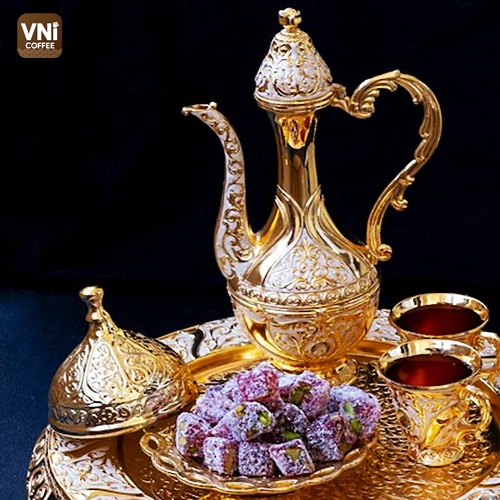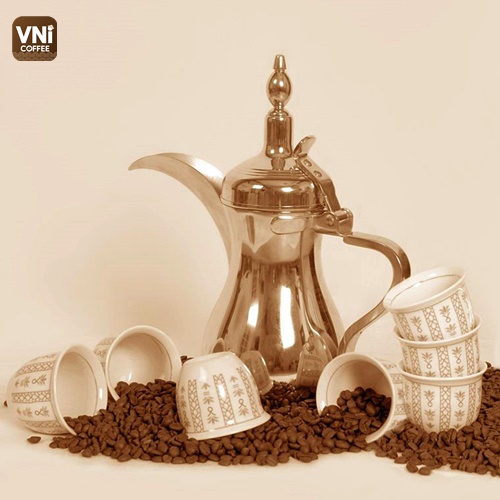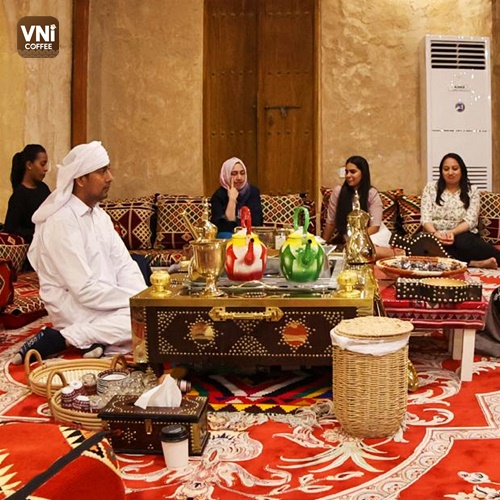
ALL ABOUT THE TRADITIONAL ARABIC COFFEE CULTURE
Dallah pot, Qahwa, and Majlis are what you will hear when speaking of the traditional Arabic coffee culture.
Drinking coffee is part of many people’s habits, and has even become a beautiful cultural tradition in many countries. Today we will discuss Arabic coffee culture with elaborate rituals around preparation, serving, and drinking. Their coffee is an extremely stimulating warm drink, characterized by a bitter taste. Coffee, or Qahwa, will be prepared in a Dallah pot and served at Majlis.
The UNESCO-recognized coffee custom shows generosity and hospitality
Coffee plays an important role in the Arabic coffee culture of North Africa and the Middle East. According to their tradition, performing the coffee ceremony is the most vital cultural norm in welcoming guests.

Arabic coffee rituals represent a rich system of inherited intangible heritage elements in the form of living habits, traditions from time immemorial, social practices, traditional crafts, and professions. This shows not only the host’s generosity, hospitality, and thoughtfulness but also the agreement or disagreement to reconcile conflicts or requests between the host and the guest.
In 2015, Arab coffee was on the Representative List of Intangible Cultural Heritage of the United Nations Educational, Scientific, and Cultural Organization.
The sophistication comes from the preparation and serving stages
The Arabic coffee ritual is usually carried out by young people in the house, starting with the selection of coffee beans, then lightly roasting on a shallow pan over a fire, then put in a bronze mortar and pound with a bronze pestle. After that, the coffee grounds will be put in a Dallah pot, cooked on fire, and served to guests.

Coffee beans will be made from Arabica beans roasted into an espresso or latte blend at a temperature between 165 °C and 210 °C. It is roasted at home, ground, brewed and served immediately to guests. The peculiarity of the taste lies in the combination of coffee and cardamom.
Dallah is a traditional Arabic coffee pot that has been used for centuries to make and serve coffee. The Dallah pot, which is made of steel, brass, or even gold, has an elongated tuber body, flared in the middle, and is held by a sinusoidal handle. Accompanying it are small glasses without handles, called Fenjan.

Coffee brewed in a Dallah pot is called Qahwa, thick and dark black. The preferred way of serving it is quite simple: plain, with no sugar or milk. However, dates, candied fruit, or nuts are often served with it to reduce bitterness.
Traditionally, coffee is prepared and served in the meeting room – Majlis, furnished with carpets, floor cushions, or sofas. Those invited to the ceremony usually come from the same family, friends, or people living in nearby areas. The most important or oldest guests are served first, then in order from left to right. Common practice is to drink at least one cup but no more than three.

While enjoying Qahwah, people will exchange news or talk about local updates, even resolve conflicts, as well as debate political, and religious issues together.
Arabic coffee is made and enjoyed by men and women from all walks of life, especially within the family. Knowledge and traditions are passed down in the family through observation and practice. Young members also go to the market with the elderly to learn how to choose the best coffee beans.
Final words
As the world is crazy about taking a cup of joe and rushing to work as a habit to start the day, the Arabs see enjoying coffee as a ritual to unite family and community. When visiting an Arab country, do not forget to try this interesting traditional cultural experience!






